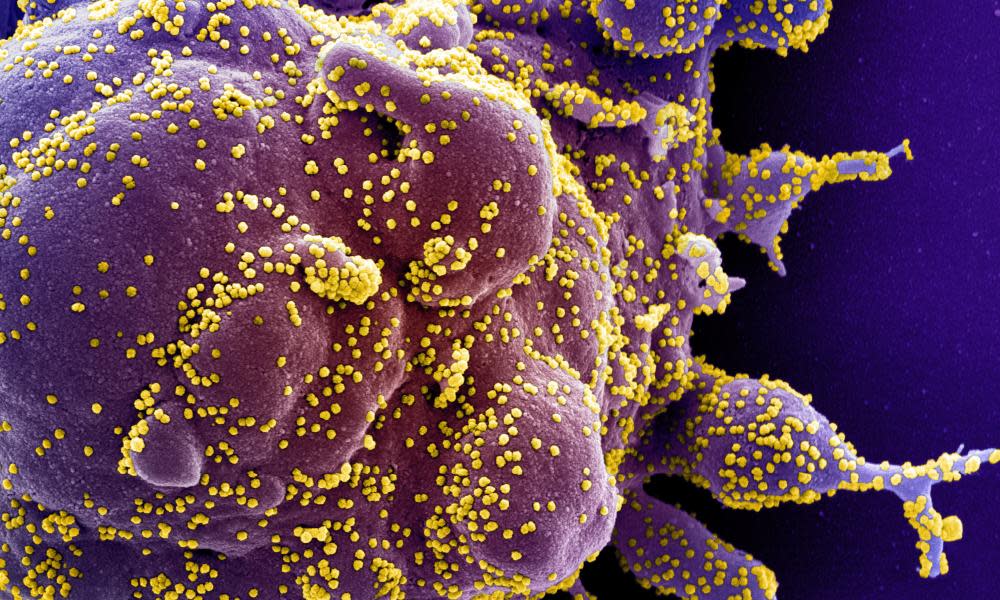Wellcome Trust urges firms to donate £6bn for Covid-19 research

The Wellcome Trust is calling on big businesses to donate $8bn (£6.4bn) for research into developing diagnostic tests, therapies and vaccines to tackle the coronavirus pandemic.
Jeremy Farrar, the director of the London-based medical research charity, said a huge investment in scientific research was “the only exit strategy” to save millions of lives and drag the global economy out of an inevitable recession.
Farrar said that while businesses and governments had acted fast to help support staff and keep the global economy ticking along, the only long-term solution was to quickly develop vaccines and treatments.
Related: When will a coronavirus vaccine be ready?
“The only exit strategy for this that I see is the development of diagnostics, therapies and vaccines,” he said. “That’s the only way we can return to normal.”
On a conference call later on Tuesday, Farrar will tell the chief executives of the world’s biggest companies that pledging funds to the Covid-Zero fund “is the best investment your business can make today”.
He said: “Businesses and governments are rightly concerned with tackling immediate concerns – how to support staff, keep trading and bolster economies. But we also need a way out of this pandemic as fast as possible.”
Farrar, who is an infectious disease researcher as well as director of the Wellcome Trust, said: “Drugs, vaccines and rapid diagnostics are the only way we have of saving lives, bringing this pandemic to an end and preventing it reappearing. This is the only exit strategy – but we do not have the funding we need to execute it.”
He said that unless businesses and governments provide funds now, Covid-19 and the economic damage caused by rolling lockdowns “will continue to plague the world”.
The World Health Organization is recommending that people take simple precautions to reduce exposure to and transmission of the coronavirus, for which there is no specific cure or vaccine.
The UN agency advises people to:
Frequently wash their hands with an alcohol-based hand rub or warm water and soap
Cover their mouth and nose with a flexed elbow or tissue when sneezing or coughing
Avoid close contact with anyone who has a fever or cough
Seek early medical help if they have a fever, cough and difficulty breathing, and share their travel history with healthcare providers
Many countries are now enforcing or recommending curfews or lockdowns. Check with your local authorities for up-to-date information about the situation in your area.
In the UK, NHS advice is that anyone with symptoms should stay at home for at least 7 days.
If you live with other people, they should stay at home for at least 14 days, to avoid spreading the infection outside the home.
Farrar said: “We want business leaders to give a small proportion of the money they are dedicating to coping with this crisis, to solving it. We hope that governments will follow their example. Otherwise, this is a global issue that will continue to plague the world – and businesses – for months, if not years, to come.”
Farrar will appeal directly to multinational business leaders during the World Economic Forum (WEF) weekly Covid-19 video conference call on Tuesday.
He will tell business bosses scientists are “working at tremendous pace” to develop vaccines, test existing drugs that could treat Covid-19 and improve diagnostic tests. “But they’re running out of funding fast, which means new developments may never reach clinical trials and, ultimately, achieve regulatory approval.”
Madonna, the Facebook founder and chief executive, Mark Zuckerberg, and the credit card provider Mastercard have already pledged millions to the Covid-19 Therapeutics Accelerator, which Wellcome launched in partnership with the Bill & Melinda Gates Foundation and forms part of the fresh initiative.
Farrar said an initial $8bn was needed by the end of April to develop drugs and vaccines and to start to scale up production across the world – and indicated that much more money would be needed in the future.
The funds will be split between the Coalition for Epidemic Preparedness Innovation (CEPI), the Covid-19 Therapeutics Accelerator and the Foundation for New Innovative Diagnostics (FIND). Money will also be provided to the World Health Organization’s (WHO) solidarity response fund, to ensure scientific innovations reach the people who need them the most. The breakdown is as follows:
$1.25bn – fund the WHO to support the most vulnerable countries.
$3bn – vaccines research and development for Covid-19 ($2bn), plus manufacturing and delivery ($1bn).
$2.25bn – therapeutics R&D for Covid-19, plus manufacturing and delivery.
$0.75bn – diagnostics R&D for Covid-19, plus manufacturing and delivery.
$0.75bn – stockpile of Covid-19 essential personal protective equipment (PPE), diagnostics, treatments and vaccines.
Dr Richard Hatchett, the chief executive of CEPI, the global alliance leading efforts to rapidly advance the development of Covid-19 vaccines, said: “The spread of Covid-19 is a global humanitarian and economic crisis. While a range of social-distancing measures have been implemented in countries and regions across the world, the development of vaccines, treatments and diagnostics is the most effective way to permanently halt the global spread of the disease.
“We are all in this together – all of us facing this same threat – and it’s down to all of us to influence what happens next. At this pivotal moment we urge the business sector to join governments and philanthropies in offering vital financial support to science, which is the only way to bring this pandemic to an end.”
The initiative is called Covid-Zero because by securing the funding, it aims to achieve zero deaths, zero new cases and zero lockdowns as soon as possible.


